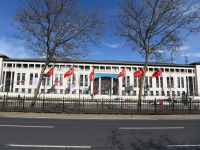The Social Security Corporation (SSC), sitting on a JD736 million surplus in bank deposits, plans to explore new investment opportunities at home and abroad in order to bolster its financial position. The surplus, idling in 23 local financial institutions and bringing in a relatively low return, will be utilized to set up and participate in local projects with prospects of entering the world market.
“The corporation is searching for new, strategic and diversified investment schemes, especially infrastructure projects in the water, energy, services and tourism sectors, besides participation in construction, housing, and education schemes,” said SSC Director General Ahmad Abdul Fattah.
“Also, the corporation is currently examining the feasibility of entering the international market,” said Fattah.
Economic experts believe it is high time for SSC to operate outside Jordan.
“It is about time for SSC to go regionally and internationally,” said Ziad Basha, an economic analyst, stressing that confining investments to the local arena would be a mistake.”
“Jordan's investment capacity is fully saturated, and having investments outside the Kingdom will be a hedge against currency devaluation,” explained Basha.
Ali Issa, a social security expert, said the SSC should try its luck abroad, but in limited sums.
“The principles that have traditionally governed SSC investments are based on economic as well as social gains, on top of which is the recruitment of Jordanian labor,” said Issa.
“But this does not mean that the SSC should continue to confine itself to the local market.”
“The idea of SSC presence abroad should be raised for financial and expertise gains,” Issa added in an interview with the Jordan Times.
Others called for the SSC to invest a chunk of its money in developing infrastructure and services that will be privatized instead of maintaining shares in the financially-troubled Jordan Phosphate Mines Company (JPMC), or other shaky shares on the stock market.
Profitability, lowest risk possible, and availability of cash when needed are the three principles governing any investment the corporation takes part in, explained Abdul Fattah.
According to the SSC figures, the size of the SSC's investments grew by 11.5 percent; JD1.4 billion by the end of November 2000 against around JD1.3 billion recorded by end of 1999.
However, a substantial cut in interest rates last year is expected to reflect in lower return on the SSC bank deposits. With a capital of JD345 million, the SSC maintains shares in 110 companies including some state-owned heavyweights; the JPMC, the Arab Potash Company, and the Jordan Press Foundation.
It also has shares in several financial institutions, including the Housing Bank for Trade and Finance, and the Arab Bank.
Investments in the tourism sector amount to JD65 million.
The SSC focuses on the tourism sector, viewing it as a promising investment field. It marked such interest by becoming a stakeholder in Zara — Jordan's largest hotel investment group after it bought around 17.5 million shares at a cost of more than JD25 million. Total investments in the sector are estimated at JD65 million, according to Abdul Fattah. Besides rebuilding tourist facilities, the SSC maintains in Aqaba and the Dead Sea area on competitive and modern bases, the corporation plans to set up a tourist village in the Dead Sea region.
Also, work is under way to separate between investment and pension and other social security through establishing a specialized investment body to run the corporation's investments. The body will enjoy flexibility in decision-making and freedom in executing the guidelines set by the SSC board of directors, explained Abdul Fattah.
In order to be able to fulfil its future obligations and cope with increases in pension payments, the SSC has drafted a law to hike monthly deductions by 1.5 percent; one percent of which will be paid by the employer and 0.5 percent by the employee.
The draft, which has been sent to Parliament for debate, also entails increasing the pensions of the corporation's beneficiaries by 25 percent, and making the minimum pension JD80. Also if endorsed, any Jordanian worker, residing here or abroad can join the SSC even if the institution where he works is not included in the SSC.
The corporation's monthly income from beneficiaries' subscriptions is put at JD12 million, while investment revenues are estimated at JD8 million.
According to Abdul Fattah, the last actuarial study, conducted on the SSC every five years, showed that the financial position of the corporation is secure and that the SSC suffers no strains at the moment, as all expenditure is currently, and for years to come will be covered by subscription revenues without touching investments earnings.
Experts anticipate that the profit-making corporation will be cash-strained between 2023-2024, when revenues and expenditure are expected to break even.
They also caution that the corporation will spend the last of its assets in 40 years. — ( Jordan Times )
By Rana Awwad
© 2001 Mena Report (www.menareport.com)







